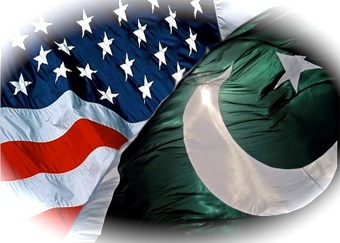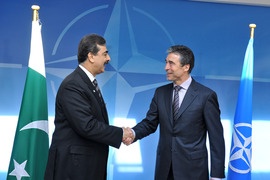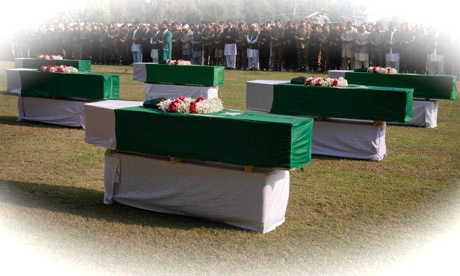


Sometimes these presumed allies could be confused for something very different. NATO is presumably investigating the killing of 24 Pakistani soldiers by its gunships, but there really should be a reevaluation of broader strategy as well as tactics. NATO and Pakistan have worked relatively well - Photo of NATO SG Rasmussen and Pakistan PM Gilani) The relationship has sunk to new lows after the killing of 24 Pakistani servicemen,(Photo of funerals), but the relationship has been sinking for some time. In Washington and some European capitals, Pakistan has been on the receiving end of sharp criticism for presumed passive tolerance/support of some insurgent groups in Afghanistan or “terror” oriented groups directed at India. The mysterious circumstances under which Osama Bin Laden found refuge in a Pakistani city dominated by the military added to suspicions. On the other hand, the US and allies have had their own misdeeds, from drone bombings that killed innocent civilians to the US intelligence operative Raymond Davis who went on a shooting spree, justified or not. It is difficult to find the outline of policy or guilt-free figures in this chaos that has evolved under the tattered banner US-NATO-Pakistan cooperation.
US and Pakistani interests did at one time have mutual convergence at one point, including the Soviet invasion of Afghanistan and even India’s dalliance with Moscow. That has largely changed to a relationship where most of the pressure is on Pakistan. Pakistan has been pressured, rightfully or not, to restrain insurgents both on its borders with Afghanistan and Kashmir (India). It is pressured on its nuclear program and viewed as much as ally as threat. Islamabad is frustrated that India’s nuclear weapons program has been largely sanctified (even though India set off the first bomb on the Sub-continent) and little has been done to resolve Pakistan’s main concerns on Kashmir, from border disputes to alleged human rights abuses by Indian security forces.
Resolving Kashmir or addressing India’s relative economic/military rise is perhaps not of particular urgency or even concern in Washington or Brussels. However, then the question is what is the incentive for Pakistan to be a compliant partner. The mutuality of interests is considerably more subtle or just difficult to embrace by all involved. US candidate Michelle Bachmann, a member of the US Congress Intelligence Committee, (and now cited similarly by CNN anchor Wolf Blitzer - Link -
situationroom.blogs.cnn.com/2011/11/28/blitzers-blog-michele-bachmann-was-right/?hpt=hp_t3) pointed out to her Republican colleagues during the last AEI/American Heritage Institute Presidential Debate that Pakistan is “too nuclear to fail” (read as too dangerous not to be a friend), and that it does not have to be subordinated to US interests but only that both countries have compatible interests. (Pakistan - essential to only resolution to its neighbor's troubles - has now also announced its intention to boycott NATO led meeting in Germany on Afghanistan in response to the killing of its soldiers).
The question now though is what are the strategic interests that are shared between Pakistan and Washington/NATO? The burden is upon the latter, as they are the outside force in the region. (Bosnia & Herzegovina and Turkey are part of the international mission in Afghanistan reducing to some degree perceived religious tension). The lack of clear strategy and/or end game in Afghanistan is part of the problem spilling over into Pakistan, and I would contend that making a deal with the Taliban is not the essential considerations in this chaos, Read: - “Losing Afghanistan?” -
diplomaticallyincorrect.org/films/blog_post/losing-afghanistan-by-ambassador-mo/36085. Foreign aid to Pakistan is only part of the possible linkage. However, recall that ordinary Pakistani’s confidence in the US has been shaken even at the humanitarian level when it was disclosed that a vaccine program also had the primary objective of genetic identification in the search for Bin Laden’s offspring. Further, as the primary route for US/NATO supplies into Afghanistan, Pakistan has commercial benefit, but also it and its citizens have suffered immensely from insurgent/Taliban attacks on such convoys.
As the NATO alliance or even the US Government, Pakistan is an amalgamation of many diverse interests, even internal contradictions. Unfortunately, today it is difficult to find a common groundswell of strategic interests. It is rather a dance of agendas that each capitals and factions within all of the involved capitals keeps trying to press forward to the top of the priority list. Interests may be compatible, but they could be readily disturbed by an over reaching by one or the other or as in the case of the killing of the 24 Pakistani soldiers, where tactics become a tragic substitute for strategy.
Close air support by NATO forces may or may not have been warranted, but when called upon it required greater care than was exercised. If the primary mission is a “kill mission” and body counts, than we have witnessed the consequences immediate and longer term in Vietnam. If the mission is to gradually win over a population, identify common ground of evolving political and societal values and thus establish basis for more deeply and mutually established shared strategic interests, the first step has to be considerably greater care and respect for the militaries and citizens of the states involved – even if it may translate at times into greater mission risk. (NATO has pursued efforts and programs that do have benefit directly for the Afghan population and do help develop more sustainable ties and shared perspectives . (See “NATO Mission” Channel: -
diplomaticallyincorrect.org/c/nato-mission). A killing of an innocent civilian or a presumably friendly soldier undermines all the efforts at good, the longer-term strategic alignment and steps toward resolution. It is also likely to cost more American, Bosnian and other NATO lives over the term of the intervention as more radicalism, frustration and anger is catalyzed.
By Ambassador Muhamed Sacirbey
Facebook – Become a Fan at “Diplomatically Incorrect”
Twitter – Follow us at DiplomaticallyX
“Pakistan Channel” -
diplomaticallyincorrect.org/c/pakistan





